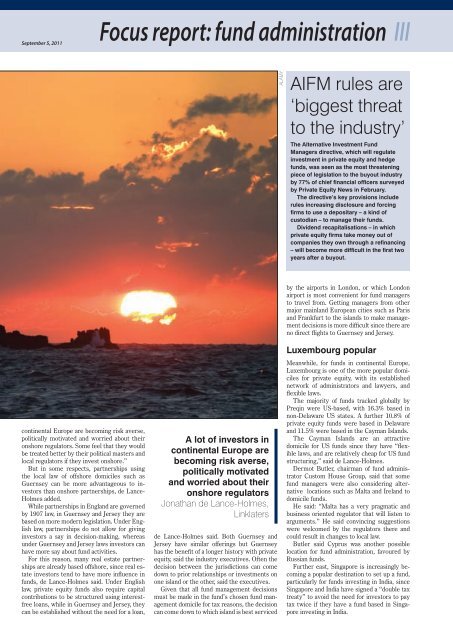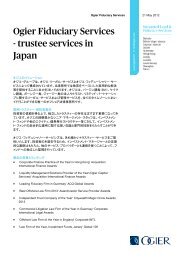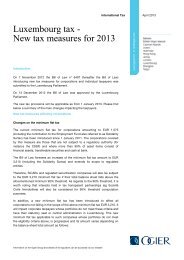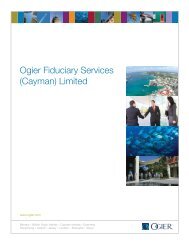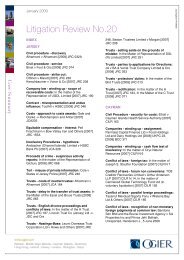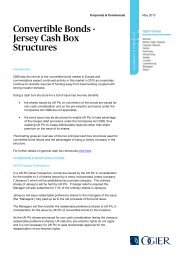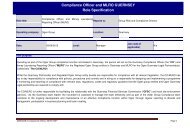fund administration - Ogier
fund administration - Ogier
fund administration - Ogier
- No tags were found...
You also want an ePaper? Increase the reach of your titles
YUMPU automatically turns print PDFs into web optimized ePapers that Google loves.
September 5, 2011Focus report: <strong>fund</strong> <strong>administration</strong> IIIalamyAIFM rules are‘biggest threatto the industry’The Alternative Investment FundManagers directive, which will regulateinvestment in private equity and hedge<strong>fund</strong>s, was seen as the most threateningpiece of legislation to the buyout industryby 77% of chief financial officers surveyedby Private Equity News in February.The directive’s key provisions includerules increasing disclosure and forcingfirms to use a depositary – a kind ofcustodian – to manage their <strong>fund</strong>s.Dividend recapitalisations – in whichprivate equity firms take money out ofcompanies they own through a refinancing– will become more difficult in the first twoyears after a buyout.continental Europe are becoming risk averse,politically motivated and worried about theironshore regulators. Some feel that they wouldbe treated better by their political masters andlocal regulators if they invest onshore.”But in some respects, partnerships usingthe local law of offshore domiciles such asGuernsey can be more advantageous to investorsthan onshore partnerships, de Lance-Holmes added.While partnerships in England are governedby 1907 law, in Guernsey and Jersey they arebased on more modern legislation. Under Englishlaw, partnerships do not allow for givinginvestors a say in decision-making, whereasunder Guernsey and Jersey laws investors canhave more say about <strong>fund</strong> activities.For this reason, many real estate partnershipsare already based offshore, since real estateinvestors tend to have more influence in<strong>fund</strong>s, de Lance-Holmes said. Under Englishlaw, private equity <strong>fund</strong>s also require capitalcontributions to be structured using interestfreeloans, while in Guernsey and Jersey, theycan be established without the need for a loan,A lot of investors incontinental Europe arebecoming risk averse,politically motivatedand worried about theironshore regulatorsJonathan de Lance-Holmes,Linklatersde Lance-Holmes said. Both Guernsey andJersey have similar offerings but Guernseyhas the benefit of a longer history with privateequity, said the industry executives. Often thedecision between the jurisdictions can comedown to prior relationships or investments onone island or the other, said the executives.Given that all <strong>fund</strong> management decisionsmust be made in the <strong>fund</strong>’s chosen <strong>fund</strong> managementdomicile for tax reasons, the decisioncan come down to which island is best servicedby the airports in London, or which Londonairport is most convenient for <strong>fund</strong> managersto travel from. Getting managers from othermajor mainland European cities such as Parisand Frankfurt to the islands to make managementdecisions is more difficult since there areno direct flights to Guernsey and Jersey.Luxembourg popularMeanwhile, for <strong>fund</strong>s in continental Europe,Luxembourg is one of the more popular domicilesfor private equity, with its establishednetwork of administrators and lawyers, andflexible laws.The majority of <strong>fund</strong>s tracked globally byPreqin were US-based, with 16.3% based innon-Delaware US states. A further 10.8% ofprivate equity <strong>fund</strong>s were based in Delawareand 11.5% were based in the Cayman Islands.The Cayman Islands are an attractivedomicile for US <strong>fund</strong>s since they have “flexiblelaws, and are relatively cheap for US <strong>fund</strong>structuring,” said de Lance-Holmes.Dermot Butler, chairman of <strong>fund</strong> administratorCustom House Group, said that some<strong>fund</strong> managers were also considering alternativelocations such as Malta and Ireland todomicile <strong>fund</strong>s.He said: “Malta has a very pragmatic andbusiness oriented regulator that will listen toarguments.” He said convincing suggestionswere welcomed by the regulators there andcould result in changes to local law.Butler said Cyprus was another possiblelocation for <strong>fund</strong> <strong>administration</strong>, favoured byRussian <strong>fund</strong>s.Further east, Singapore is increasingly becominga popular destination to set up a <strong>fund</strong>,particularly for <strong>fund</strong>s investing in India, sinceSingapore and India have signed a “double taxtreaty” to avoid the need for investors to paytax twice if they have a <strong>fund</strong> based in Singaporeinvesting in India.


